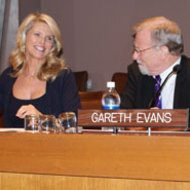Panel event organized by the Global Security Institute and the Government of Austria
May 6, 2009
Project Report
by Jim Wurst, MPI Program Director
“Progressive Initiatives”, a UN panel event organized by the Global Security Institute (GSI) and co-sponsored by the Government of Austria, was designed to highlight proposals for nuclear non-proliferation and disarmament, especially in light of the new potential openings on the international scene, and to look at them from the perspectives of civil society, international experts and parliamentarians.
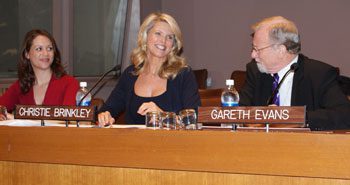 |
|
|
Ms. Rhianna Tyson, GSI Senior Officer, chaired the panel. Remarking on the diversity of the panelists’ backgrounds and noting the disarmament proposals of Secretary-General Ban Ki-moon and President Obama, Ms. Tyson said, “These men, as courageous and important as their leadership on this issue is, didn’t come up with the idea to abolish nuclear weapons on their own. They are part of a long history of a movement, a movement that has existed as long as the weapons themselves have existed.” She noted the Secretary-General’s five point plan, rather than being a series of steps, is “a variety of suggestions to be pursued by a variety of actors: the P5, the Security Council, the Conference on Disarmament, and so forth. Like a social movement, each course of action will serve to buttress and reinforce the efficacy of other courses of action, pursued by other actors.”
Ms. Christie Brinkley, a model and member of the GSI Board of Advisors, said it was time to work on common purposes. “Where is our sense of human security?,” she said, “With half the human family living on less than two dollars per day, and the Millennium Development Goals so easily met with a mere fraction of what is spent on militaries, can we fulfill our basic sense of compassion and justice without a new spirit of cooperation? Have we not recently seen that the metrics of unbridled selfishness lead to the folly of loneliness and spiritual poverty?” loneliness and spiritual poverty?”
She added that, “We simply must establish some sense of balance and proportion. A new sense of cooperation amongst all peoples of all races and religions is a new necessity if we are to live with any sense of human values.” Eliminating nuclear weapons needs cooperation, she argued, saying that the world relies “on the security of each of the weakest links in the security chain.” Pointedly addressing the diplomats and activists in the conference room, Ms. Brinkley said, “Now is the time to be bold … Now is the time to work without cynicism, doubt, or fear. I want to tell my children that I met the men and women who worked to free us all from the terror of nuclear weapons, the men and women who decided to change history and save history.”
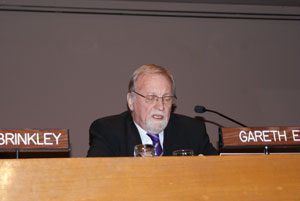 |
|
The Hon. Gareth Evans, former Foreign Minister of Australia, discussed the need for both top-down and popular actions to advance the agenda, which will be a key focus of the International Commission on Nuclear Non-proliferation and Disarmament (ICNND), of which he is a Co-Chair. “We want to energize a high-level political debate and harness the energy that is out there, intellectually and otherwise, and try to create very explicit action plans for the short-term, the medium-term, and the long-term, which will actually deliver on all of this. It is a pretty heroic ambition.” He said the ICNND will have an added value to the reports that have come before it, including the Canberra Commission and the WMD Commission, because the ICNND “will not just be analysis-oriented but action-oriented as well. We see the necessity to come up with action plans that are translatable into effective action about which everybody can be campaigning, including bottom-up civil society.”
The short-term action plan focused on the 2010 NPT Review Conference with the hope for a package that would include a “re-articulation” of the 13 Practical Steps. Medium-term, which he defined as up to 2012, would include the conclusions of the Comprehensive Test Ban (CTBT) and Fissile Materials Cut-Off Treaties (FMCT), the resolution of the Korean and Iranian controversies and “real movement” on nuclear disarmament. Beyond that – to 2025 – Mr. Evans said we may have “a very defined disarmament objective really achieved by then. It won’t be a world without nuclear weapons, because I think that is far too heroic” but it would be a world “with a very minimum number of warheads” (perhaps in the hundreds), none of them deployed or so few deployed “that there is not the same kind of anxiety about misuse, accident or otherwise.” He added, “We also hope there is an acceptance universally by the nuclear weapon states of a doctrine that says that if these things are going to exist at all, they will only do so for the purpose of deterring other countries from using nukes.”
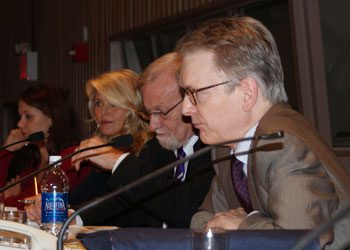 |
|
|
Ambassador Henrik Salander, the Chairman of the Middle Powers Initiative (MPI), noted the numerous progressive initiatives on the scene – including ICNND, the Secretary-General’s 5-point plan, Global Zero, the Blix Commission, the Nuclear Threat Initiative, and MPI – and said, “These initiatives and others reinforce one another, and sooner or later… one or two or more of them will bear fruit.” He focused on the work of MPI in defining and advancing the progressive disarmament agenda. The goal, he said, “ was to encourage and help develop a coalition of non-nuclear weapon state governments which could articulate those countries’ demands and pressure the nuclear weapon states.” Independently and simultaneously, the New Agenda Coalition was formed with the same strategy in mind. The New Agenda acted as “a negotiating counterpoint” to the nuclear weapons states at the 2000 NPT Review Conference. One of the results of those negotiations was the 13 Practical Steps. The next five years were less fruitful with some of the nuclear weapon states backtracking from their 2000 commitments, culminating in the failure of the 2005 Review Conference, he said. This led to the creation by MPI of the Article VI Forum, which has sponsored a series of consultations where like-minded non-nuclear weapon states “wanting to change the status quo and renew the NPT bargain” could discuss strategies.
He also noted the many commonalities of the steps advanced by these groups and initiatives – the CTBT, FMCT, deep cuts in strategic arsenals – are common to many of them. H e said these similarities are not a coincidence. “These measures are the logical building blocks for securing confidence and restoring the bargain once made between possessors and non-possessors of nuclear weapons.”
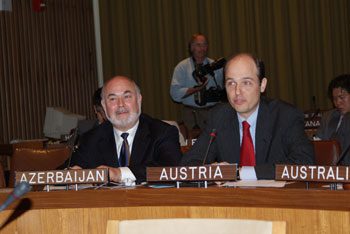 |
|
|
Amb. Salander said there was an important difference embedded in Secretary-General’s proposal. “He holds up the possibility of a nuclear weapons convention – either that, or a framework of instruments, in order to secure that the NPT is upheld and Article VI fulfilled. This is a remarkable arrival; the nuclear weapons convention has stepped forward, from a slightly utopian conversation piece, to a fully pragmatic and even logical instrument for strengthening the security of nations.”
Amb. Salander added, “The draft convention has a practical role already today. This is because it jumpstarts analysis, leads directly to the central issues, and helps to focus our thinking about the next steps after the packages that the great majority of governments agree upon.”
He also examined two “sometimes neglected issues” in the nuclear weapons debate: NPT governance – “how the treaty is treated in practical terms” – and Security Council reform. He said governance issues – the lack of a standing bureau or secretariat, no mechanisms for urgent meetings of the states party – “may seem trivial, compared to the dangers of nuclear weapons” but if parties “treat their Treaty as if it doesn’t matter very much and doesn’t need good governance,” then they are making “a grave mistake.” He said Security Council reform was necessary because “in a world with very few nuclear weapons, or none at all, it will not be tenable over time that the five ultimate guardians of compliance with a future convention… would be exactly those five states which have monopolized the possession of these ultra-violent weapons for such a long time.”
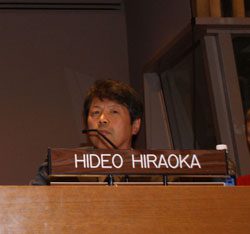 |
|
Mr. Hideo Hiraoka, MP from Japan and an Executive Director of the Democratic Party of Japan Nuclear Disarmament Group, focused on how the work of parliamentarians assist organizations such as Parliamentarians for Nuclear Non-proliferation and Disarmament (PNND) and the Inter-Parliamentary Union (IPU) to fulfill their missions. He pointed out the vital role the IPU played in establishing nuclear weapon free zones (NWFZs) and how parliamentarians are now actively promoting NWFZs in North East Asia, the Middle East, Central Europe and the Arctic. In the Middle East, Mr. Hideo said, PNND members – including some from Israel – have been supporting the proposal of a moratorium on nuclear fuel cycle activities as a first step towards a NWFZ.
Turning to Northeast Asia, Mr. Hideo said, “I would like to speak on our efforts to establish such a zone… In the draft treaty, we have adopted a scheme called the ‘three plus three nations arrangement.’” The first three states are the central parties to the zone: North and South Korea and Japan. The treaty would later expand out to “the latter three supportive states, namely the United States, China, and Russia.” These states would support the zone through security assurances, building on the 1992 Inter-Korean Joint Declaration on the Denuclearization of the Korean Peninsula. Mr. Hideo is one of the drafters of the treaty.
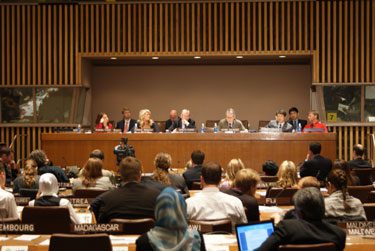 |
////
![]()

